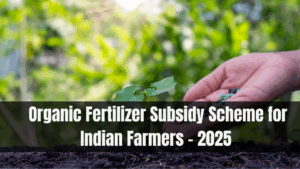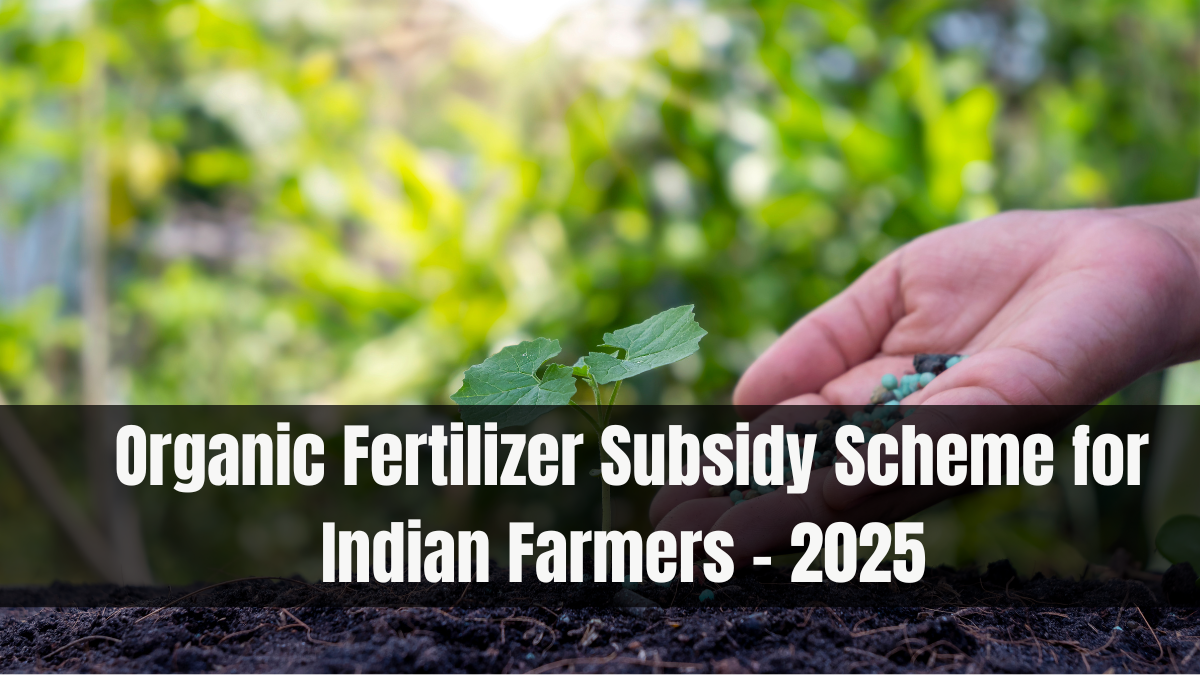The push for sustainable agriculture in India has taken a major leap forward in 2025 with increased focus on the organic fertilizer subsidy. Backed by the Ministry of Agriculture and Farmers Welfare, this scheme supports farmers who are shifting from chemical-based farming to more eco-friendly, organic practices.
The scheme aims to improve soil health, crop quality, and long-term productivity while reducing dependence on synthetic fertilizers. With climate change and food safety concerns rising, Indian farmers are embracing this green shift—and the government is ensuring financial assistance to make the transition smoother.

What Is the Organic Fertilizer Subsidy?
The organic fertilizer subsidy is a financial aid program offered by the central and state governments to promote the use of bio-fertilizers, compost, and other organic inputs. This initiative falls under the Paramparagat Krishi Vikas Yojana (PKVY) and National Mission for Sustainable Agriculture (NMSA).
Under this subsidy, farmers receive partial reimbursement or direct benefit transfers (DBT) for purchasing approved organic fertilizers like:
-
City compost
-
Vermicompost
-
Biofertilizers (like Rhizobium, Azotobacter, etc.)
-
Phosphate Rich Organic Manure (PROM)
-
Organic manure prepared from waste
This encourages adoption of natural alternatives without compromising crop yield.
Subsidy Amount and Coverage in 2025
As per the latest data from April–July 2025, the government has increased budget allocations and widened the scope of the subsidy. Key highlights include:
-
Subsidy Rate: ₹500 – ₹1,200 per tonne (depending on the fertilizer type)
-
Coverage: Up to 2 hectares per farmer
-
Beneficiary Type: Small and marginal farmers prioritized
-
Mode of Payment: Direct Bank Transfer (DBT)
States like Maharashtra, Madhya Pradesh, Tamil Nadu, and Uttar Pradesh have launched additional top-up subsidies to encourage higher adoption.
How to Apply for the Organic Fertilizer Subsidy
Farmers can avail the organic fertilizer subsidy through a simple application process:
-
Visit the respective state agriculture department website or local Krishi Vigyan Kendra (KVK)
-
Register as a farmer beneficiary using Aadhaar and land ownership proof
-
Submit a subsidy application form along with invoice of organic fertilizer purchase
-
Receive verification from block or panchayat agriculture officer
-
Approved subsidy amount is credited via DBT within 30 days
The government also provides training and demonstration programs to raise awareness and usage of organic fertilizers.
Eligibility Criteria for Farmers
To benefit from the organic fertilizer subsidy in 2025, farmers must meet the following eligibility:
-
Must be an Indian citizen owning cultivable land
-
Aadhaar-linked bank account
-
Land size not exceeding 5 hectares (priority for smallholders)
-
Purchase fertilizers from approved vendors or cooperatives
-
Participating in organic farming schemes like PKVY or NMSA
Tenant farmers may also be eligible if they provide proof of land cultivation and agreement.
Benefits of Organic Fertilizer Use
Switching to organic fertilizers has both environmental and economic benefits for Indian agriculture:
-
Enhances long-term soil fertility
-
Increases water retention and microbial activity
-
Reduces input cost over time
-
Improves crop health and taste
-
Meets growing demand for organic produce
-
Fetches better market prices
With the organic fertilizer subsidy, farmers can begin the transition without bearing the full cost burden.
State-Wise Subsidy Allocation (2025 Snapshot)
| State | Subsidy Rate (₹/tonne) | Extra Support |
|---|---|---|
| Maharashtra | ₹1,200 | 25% additional DBT |
| Uttar Pradesh | ₹1,000 | Awareness campaigns |
| Tamil Nadu | ₹800 | Composting training |
| Madhya Pradesh | ₹1,100 | Cooperative incentives |
| Rajasthan | ₹900 | Vermicompost promotion |
FAQs
Who is eligible for the organic fertilizer subsidy?
All Indian farmers owning land and participating in organic schemes like PKVY or NMSA are eligible, especially small and marginal farmers.
How much subsidy can I get?
You can receive between ₹500 to ₹1,200 per tonne depending on the fertilizer and state-specific rates.
Where can I buy eligible organic fertilizers?
From approved cooperatives, government-authorized vendors, or agriculture department-recognized compost units.
Is Aadhaar mandatory for the subsidy?
Yes, Aadhaar linking is mandatory to ensure DBT payments to your registered bank account.
Can I combine this subsidy with other farming schemes?
Yes, farmers can simultaneously benefit from other government schemes like PM-KISAN, Soil Health Card, and drip irrigation incentives.
Click here to know more.
